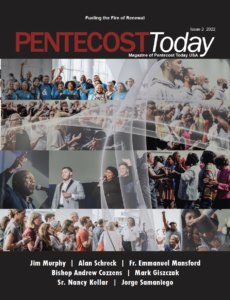Second Sunday of Lent
Meditation and Questions for Reflection or Group Discussion
Mass Readings:
1st Reading: Genesis 22:1-2, 9-13, 15-18
Responsorial: Psalm 116:10, 15-19
2nd Reading: Romans 8:31-34
Gospel: Mark 9:2-10
Lent, An Opportunity for a Deeper Response to God’s Call
Here I am! (Genesis 22:1)
Abraham must have felt trapped. He had already given up so much to follow the Lord, and God had blessed him richly. So logic would tell him that he would be blessed if he obeyed the Lord this time. But this was the hardest thing God could possibly ask of him: to kill his son with a knife and burn his corpse in ritual sacrifice. Could God really want that? But Abraham had already told God, “Here I am!” (Genesis 22:1). He had committed himself, and there was no backing out.
Try to imagine that three-day journey to the place of sacrifice. The silence, the awkward answers to Isaac’s questions, the agonizing over what he was about to do. How many times did Abraham almost turn around and head back home? But somehow, Abraham trusted that God would still fulfill his promises. So when he arrived at the place, Abraham told his servants, “We will . . . come back to you” (Genesis 22:4). Even then, he trusted that both he and Isaac would return.
Notice, when the angel intervenes, Abraham again repeats the only thing he had said to God so far: “Here I am” (Genesis 22:11). These words must have sounded much different now, three harrowing days later, as he was on the verge of doing the unthinkable to his son. Imagine the fear, the exhaustion, even the anger, in his voice. Yet even now, as his grip on his faith was fragile at best, he held on and trusted.
We all have times when God seems to be asking the impossible of us: to accept a terminal illness or permanent disability; to resolve a bitter, long-standing conflict; to give up on a treasured dream. Abraham’s response, “Here I am,” may feel like the hardest thing to say. But this story tells us that God still loves us and is still offering us his grace.
So if it feels like you’re barely hanging onto your faith, remember Abraham. Remember that God is still with you. And even if the unthinkable occurs, repeat what Abraham said to God: “Here I am” (Genesis 22:1, 11).
“Here I am, Father. I trust that you will never abandon me.”
Download this reflection with discussion questions here.
(Many thanks to The Word Among Us for allowing us to use meditations from their monthly devotional magazine. Used with permission. For more information on how to subscribe to their magazine, go to www.wau.org).
Sunday, February 25, 2018
Questions for Reflection or Group Discussion:
- In the first reading, God tests Abraham with these words: “Take your son Isaac, your only one, whom you love, and go to the land of Moriah. There you shall offer him up as a holocaust.” When Abraham demonstrates his faith in God by his willingness to obey this heart wrenching command to sacrifice Isaac, he is stopped with these words: “I know now how devoted you are to God, since you did not withhold from me your own beloved son.”
- Why do you think God tested Abraham the way he did, even though, being God, he must have known what Abraham’s response would be?
- In what ways do words such as “your only one” and “your own beloved son” in the reading remind you of Jesus’ sacrifice on the cross? What are the similarities and what are the differences? (Hint: see John 3:16.)
- In the first reading from last Sunday’s Mass, God formed a covenant with Noah. In this week’s reading, he makes one with Abraham with these words: “I will bless you abundantly and make your descendants as countless as the stars of the sky and the sands of the seashore . . . all this because you have obeyed my command.”
- How would you describe the reasons God made a special covenant with Noah and Abraham?
- God may never ask you to do what he asked of Noah and Abraham. However, in what areas of your life do you think God may be asking you to obey him more?
- The responsorial psalm opens with these words: “I believed even when I said, ‘I am greatly afflicted.’ Precious in the eyes of the LORD is the death of his faithful ones.” The psalmist goes onto pray: “O LORD, I am your servant; I am your servant, the son of your handmaid; you have loosed my bonds.”
- In what ways do the words of the psalmist reflect the same kind of faith Abraham displayed in the 1st reading?
- In your times of “afflictions,” what are the things that keep you from turning confidently to the Lord and believing he can loose your bonds? What are the things that allow you to turn confidently to the Lord, and be set free?
- The second reading from Romans begins with these words: “If God is for us, who can be against us? He who did not spare his own Son but handed him over for us all, how will he not also give us everything else along with him?”
- How would you describe, from the reading, what St. Paul believes is the Christian’s first and final answer in times of difficulty, despair, suffering, and fear?
- How can you apply Paul’s answer to your own life?
- In the story of the Transfiguration in the Gospel reading, Jesus shows forth his divine glory: “And he was transfigured before them, and his clothes became dazzling white, such as no fuller on earth could bleach them.” In response to the “terrified” reply of Peter, the reassuring voice of the Father is heard saying: “This is my beloved Son, listen to him.”
- In what way is the Transfiguration a foreshadowing of Jesus’ resurrection?
- During Lent, how can we take more seriously these words of the Father, which are also meant for us: “This is my beloved Son, listen to him”?
- The meditation is a reflection on the first reading describing God’s command to Abraham to sacrifice Isaac, and on Abraham’s initial response when God called to him: “Here I am Lord.” The meditation ends with these words: “We all have times when God seems to be asking the impossible of us: to accept a terminal illness or permanent disability; to resolve a bitter, long-standing conflict; to give up on a treasured dream. Abraham’s response, ‘Here I am,’ may feel like the hardest thing to say. But this story tells us that God still loves us and is still offering us his grace. So if it feels like you’re barely hanging onto your faith, remember Abraham. Remember that God is still with you. And even if the unthinkable occurs, repeat what Abraham said to God: ‘Here I am’ (Genesis 22:1, 11).”
- How would you describe the meaning of Abraham’s response (“Here I am Lord”) when God called out to him?
- During this grace-filled season of Lent, how can you respond more fully to God’s call for your life with a greater trust in his love for you, and a greater reliance on his grace to get through all circumstances in your life?
- Take some time now to pray and ask the Lord for the grace to always say yes to his call and the grace to trust in him? Use the prayer below from the end of the meditation as the starting point.
“Here I am, Father. I trust that you will never abandon me.”
[The discussion questions were created by Maurice Blumberg, who is currently a member of the board of directors of the ChristLife Catholic Ministry for Evangelization (www.christlife.org/), a member of the National Service Committee Council of the Catholic Charismatic Renewal (www.nsc-chariscenter.org), and a member of the Love of Christ Foundation board. Maurice was also the founding executive director of the National Fellowship of Catholic Men and a former chairman of the board of The Word Among Us (www.wau.org). He can be contacted at (Enable Javascript to see the email address) mblumberg@wau.org or mblumberg@aol.com.]


 Click Here for us to pray for your intentions through our new website.
Click Here for us to pray for your intentions through our new website. 
